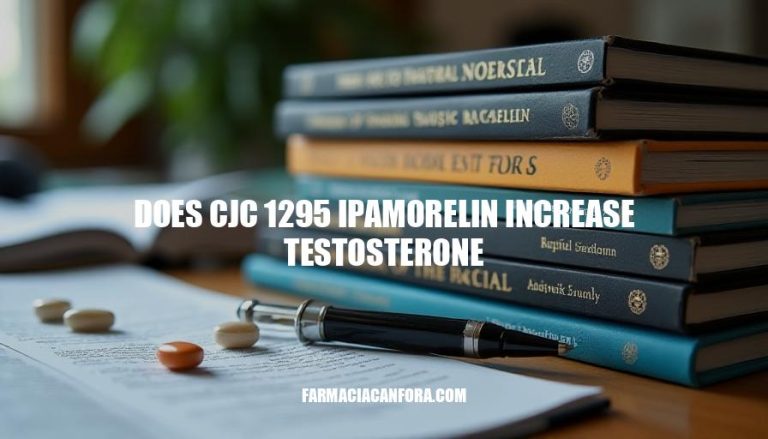


Let’s talk about CJC 1295 Ipamorelin and how it affects testosterone. These two synthetic peptides are used in fitness and anti-aging therapies. CJC 1295 helps release growth hormone, which can lead to muscle growth and fat loss.
Ipamorelin works similarly but doesn’t affect cortisol and prolactin levels as much. When combined, they’re thought to work better together. But the question is, do they also boost testosterone?
We’ll look at what research says and expert opinions to find out.
CJC 1295 and Ipamorelin are synthetic peptides known for their roles in stimulating the release of growth hormone (GH) within the body. CJC 1295 is an analog of growth hormone-releasing hormone (GHRH) and works by binding to GHRH receptors in the pituitary gland, thereby stimulating the release of GH. It has a prolonged half-life, especially when combined with a Drug Affinity Complex (DAC), which allows for sustained GH release.
This leads to increased muscle mass, fat loss, improved sleep quality, and enhanced tissue regeneration.
Ipamorelin, on the other hand, is a selective growth hormone secretagogue (GHS) that mimics the action of ghrelin by binding to the growth hormone secretagogue receptor (GHS-R). This binding triggers the release of GH from the pituitary gland without significantly affecting other hormone pathways, such as cortisol or prolactin. Ipamorelin is known for its ability to increase muscle mass, improve bone density, and enhance fat metabolism.
When used together, CJC 1295 and Ipamorelin create a synergistic effect, maximizing the release of GH and providing a range of benefits, including muscle growth, fat loss, and improved overall health.
This combination is popular in fitness and bodybuilding communities for its effectiveness in enhancing body composition and performance.
Research on the link between these peptides and testosterone levels is limited. However, some studies have explored the potential effects of GH-releasing peptides on testosterone. For instance, a study on the Tesamorelin, Ipamorelin, and CJC-1295 blend suggested that these peptides might modulate the endocrine system’s GH regulatory axis, potentially influencing testosterone levels.
Despite this, more research is needed to establish a definitive connection between CJC 1295, Ipamorelin, and increased testosterone levels.
:
:
:
:
:
:
:
:
1muscleandbrawn.com2www.genemedics.com3www.eternityhealthpartners.com4www.peptidesystems.com5www.peptidesinstitute.org6www.cochrane-handbook.org7muscleandbrawn.com8biotechpeptides.com
CJC 1295 and Ipamorelin are synthetic peptides that stimulate the release of growth hormone (GH), leading to muscle growth, fat loss, improved sleep quality, and enhanced tissue regeneration. When used together, they create a synergistic effect, maximizing GH release and providing various benefits.
Research on their link to testosterone levels is limited, but some studies suggest that these peptides might modulate the endocrine system’s GH regulatory axis, potentially influencing testosterone levels. However, more research is needed to establish a definitive connection between CJC 1295, Ipamorelin, and increased testosterone levels.
The combination of CJC 1295 and Ipamorelin does not directly boost testosterone levels, but rather works on the GH pathway, which may have indirect effects on testosterone production. It’s essential for individuals interested in using these peptides to consider their potential implications, such as:
Before starting any new supplement regimen, including CJC 1295 and Ipamorelin, it’s crucial to consult with a healthcare professional to discuss potential risks and benefits. They can help determine the best course of treatment and ensure safe use of these peptides.